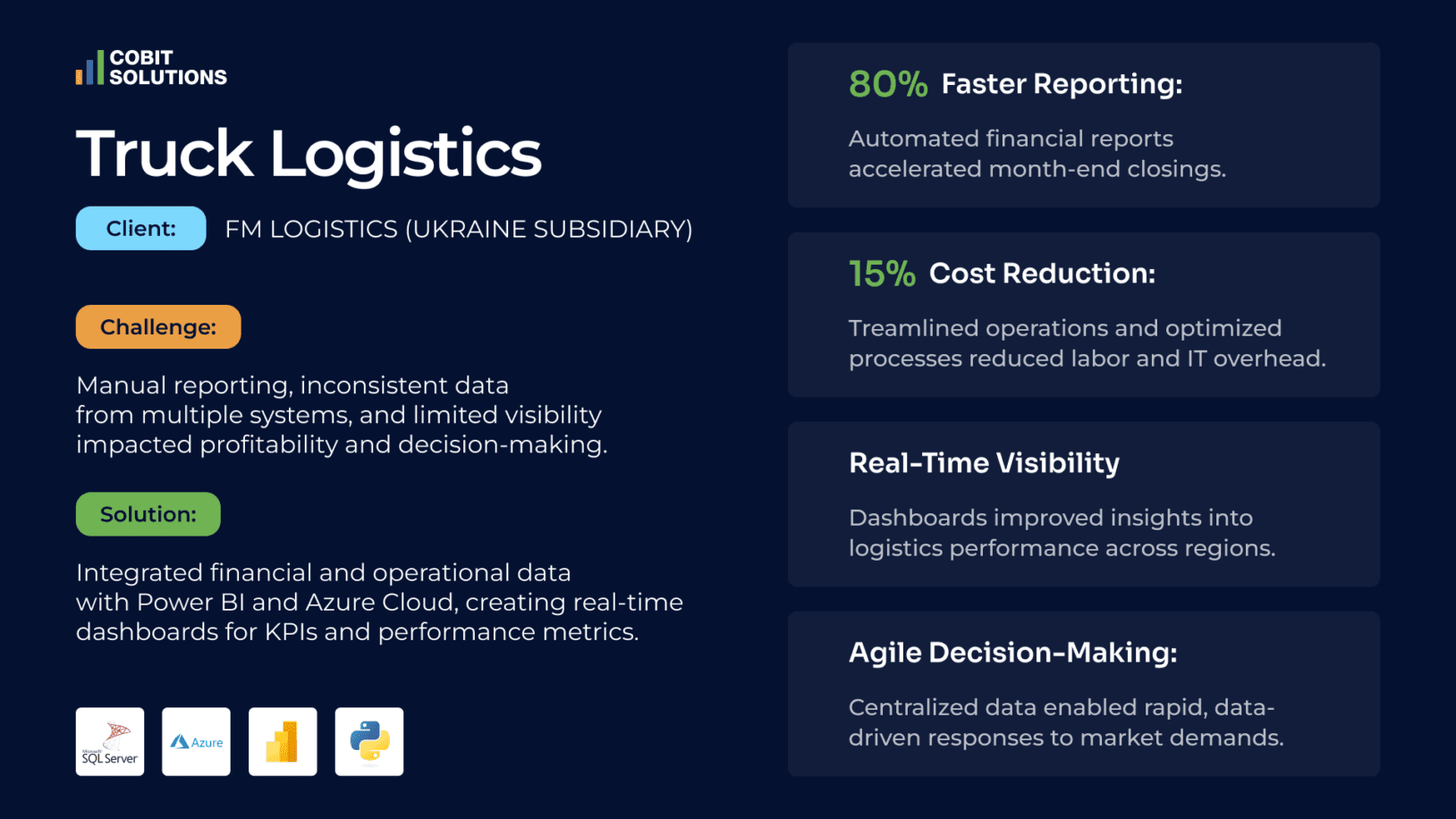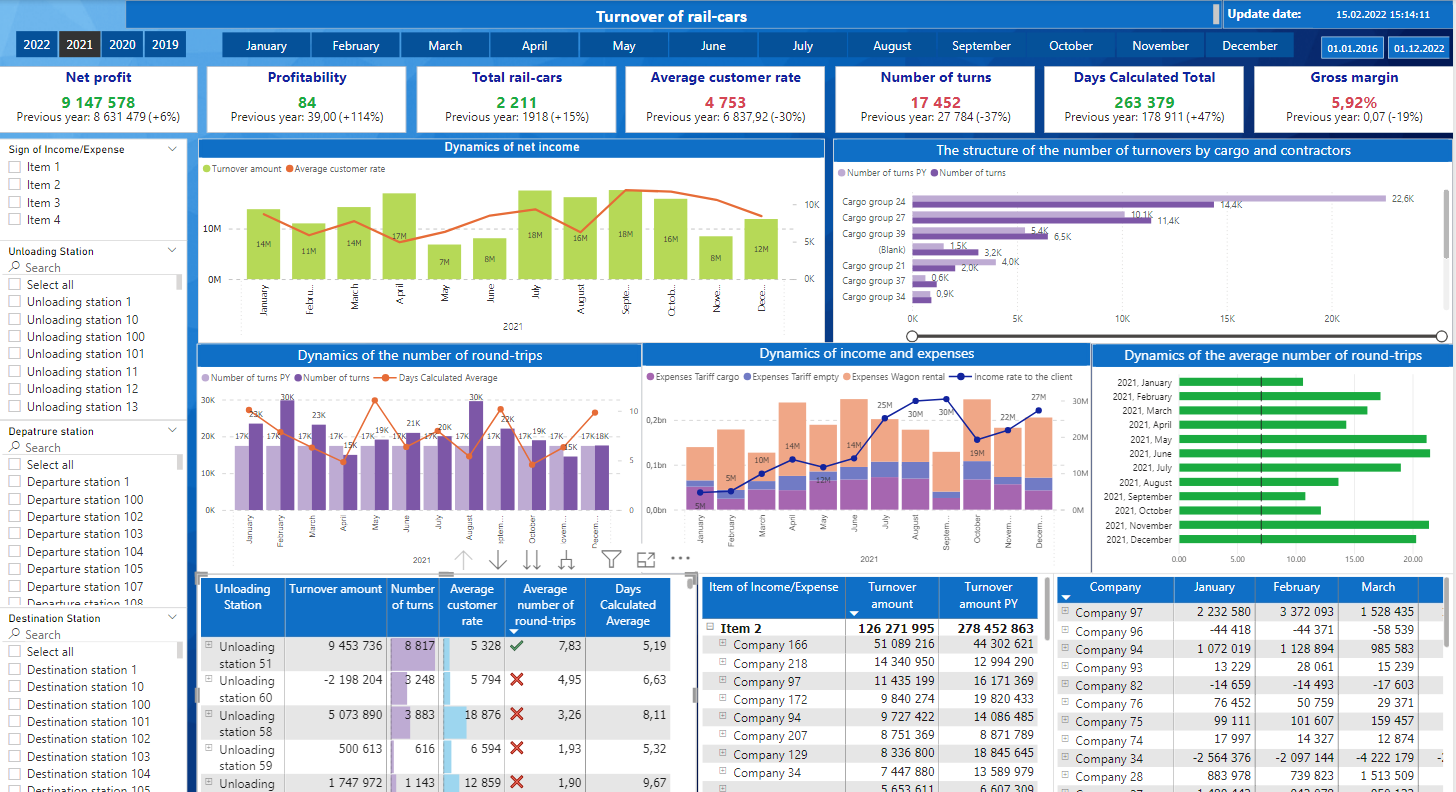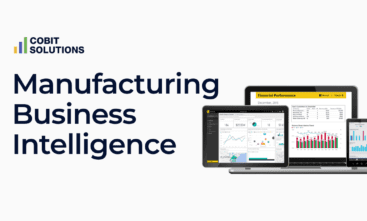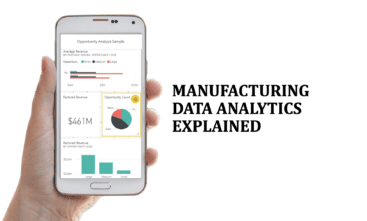
Business Intelligence in the Logistics Industry
The logistics industry is all about efficiency, accuracy, and speed. With complex global supply chains, fluctuating demand, and the need for real-time data, logistics companies face significant challenges in ensuring seamless operations. This is where logistics business intelligence—and specifically Power BI—comes into play. Through data integration, real-time analytics, and insightful dashboards, BI tools like Power BI empower logistics companies to stay agile, make informed decisions, and improve operational efficiency.
Why Business Intelligence Matters in Logistics
In logistics, data is at the heart of operations. From tracking shipments to managing inventory and forecasting demand, logistics companies rely on data to streamline their processes and optimize resources. However, managing data manually or through disparate systems often leads to inefficiencies, delays, and costly errors. Business intelligence in the logistics industry provides the ability to consolidate data, analyze trends, and gain a holistic view of operations—all in real-time.
Consider this: 92% of supply chain companies report that enhanced data visibility helps them identify issues faster, and 89% see improved operational efficiency after implementing BI tools. With logistics companies handling vast amounts of data from multiple sources, business intelligence logistics solutions like Power BI offer a way to unify, visualize, and act on data in a centralized platform.

Why Business Intelligence Matters in Logistics
In the logistics sector, data is at the heart of operations. From tracking shipments to managing inventory and forecasting demand, logistics companies rely heavily on data to streamline processes and optimize resources. However, managing data manually or through disparate systems often leads to inefficiencies, delays, and costly errors. This is where business intelligence in logistics plays a pivotal role by providing the ability to consolidate data, analyze trends, and gain a holistic view of operations—all in real time.
Consider this: 92% of supply chain companies report that enhanced data visibility helps them identify issues faster, and 89% see improved operational efficiency after implementing business intelligence in supply chain management tools.
With logistics companies handling vast amounts of data from multiple sources, transportation business intelligence solutions like Power BI offer a powerful way to unify, visualize, and act on data in a centralized platform. By leveraging Power BI dashboards for logistics, companies can track key logistics KPIs, conduct transportation cost analysis, and forecast demand with improved accuracy. Ultimately, Power BI implementation for logistics empowers companies to stay agile and responsive in a data-driven world, helping to achieve optimal supply chain visibility and operational efficiency.
Whether focusing on real-time tracking or predictive analytics for logistics, business intelligence in supply chain management tools are indispensable for modern logistics management.
Key Benefits of Power BI
in Logistics
- Real-Time Data Insights
In logistics, real-time data is crucial, where even minor delays can disrupt the entire supply chain. With Power BI for logistics, companies can access live data from multiple sources, allowing them to monitor key logistics KPIs, track shipments, and make real-time adjustments to operations.
Example: For instance, DHL uses Power BI to gain real-time insights into its delivery network, helping reduce delays and optimize routes. By using Power BI dashboards for logistics, they can monitor driver performance, fuel usage, and package tracking—all in one place—leading to a 20% improvement in delivery times.
- Improved Operational Efficiency
BI tools like Power BI reduce the need for manual reporting, automate data consolidation, and increase reporting accuracy. This boost in operational efficiency translates into significant cost savings, allowing logistics managers to focus on strategic tasks rather than administrative processes.
Example: Linfox, a logistics giant in Australia, used Power BI to streamline its warehousing and distribution processes, saving up to 25% in labor costs and enhancing the accuracy of inventory tracking across locations. This Power BI implementation for logistics demonstrates how BI tools can help logistics companies optimize operations and cut costs.
- Predictive Analytics for Better Planning
Logistics is about addressing present challenges and preparing for the future. Power BI’s predictive analytics capabilities allow logistics companies to forecast demand, optimize logistics routes, and manage inventory based on data-driven trends.
Example: FedEx uses Power BI to analyze historical shipping data and predict peak demand periods, enabling them to prepare in advance and improve customer service. This predictive analytics for logistics has helped them improve their on-time delivery rate by 15% during peak seasons, showcasing the value of business intelligence tools in proactive logistics planning.
Power BI Case Study: FM Logistics in Truck Logistics
Industry: Truck Logistics
Company: FM Logistics, a global logistics conglomerate with operations in Ukraine, serves major clients like FMCG retailer Metro.
Challenges:
❌ Complex Global Operations: FM Logistics struggled with managing financial reporting across multiple regions and systems, leading to inconsistent data.
❌ Manual Processes: The manual data reporting process was time-consuming, which slowed decision-making.
❌ Limited Visibility: Lack of real-time access to financial and operational metrics made it difficult for management to make timely decisions, impacting profitability.
Solutions by Cobit Solutions:
- Data Integration: Using Power BI and Microsoft Azure, we unified FM Logistics’ financial and operational data across multiple systems.
- Real-Time Dashboards: Custom dashboards were developed to monitor financial performance, operational efficiency, and KPIs, giving FM Logistics the visibility they needed.
- Cloud Infrastructure: By leveraging Azure Cloud, we enabled secure, scalable access to real-time data across global locations, increasing accessibility and reliability.
Results:
- Streamlined Reporting: FM Logistics cut data consolidation time by 80%, speeding up closings and improving forecast accuracy.
- Better Visibility: Real-time dashboards highlighted inefficiencies, reducing delivery times.
- Cost Savings: Optimized processes led to a 15% drop in operational costs, including labor and IT savings.
- Faster Decisions: Centralized data enabled rapid, data-driven decision-making, boosting agility.
Why Choose Cobit Solutions?
We specialize in delivering cutting-edge business intelligence and analytics solutions for logistics companies and other industries. Whether you need to improve your financial reporting, optimize supply chain performance, or gain better visibility into your key metrics, our team of experts is here to help.
Contact us today to schedule a consultation and learn how our customized dashboards and data solutions can empower your business with the insights you need to make smarter decisions and achieve your goals.



















